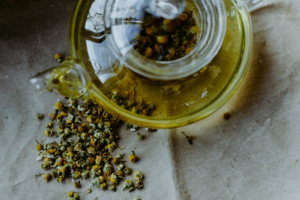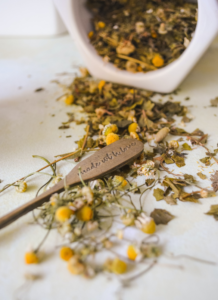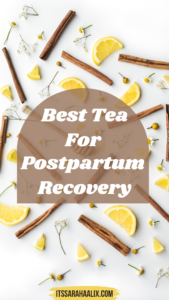This post is all about the best teas for postpartum recovery!

Pregnancy and childbirth are incredible journeys that can take a toll on a woman’s body. The physical and emotional demands of bringing a new life into the world can leave you feeling drained and in need of some much-deserved TLC. A great way you could support your postpartum journey is to drink tea and herbal tea. We are all about the best teas for postpartum recovery in this post.
Drinking the right teas can play a crucial role in your postpartum recovery. These teas not only support your healing process but also aid in increasing your milk supply, a vital component of your breastfeeding journey (if you are breastfeeding!).
In this article, we are going to delve into the world of tea, exploring the remarkable benefits that certain herbal infusions can offer new mothers. From understanding the power of herbal teas in postpartum recovery to discovering specific teas that enhance milk production, we will provide you with the knowledge you need to embrace these natural remedies.
But that’s not all. We won’t leave you hanging with just one or two tea options. We’ll also unveil the perfect tea blend that combines the healing properties of different herbs to ensure a faster and easier postpartum recovery while increasing your milk supply.
So, get ready to sip your way to a smoother postpartum journey. No postpartum depression here!
Disclaimer: like with anything relating to your health and the health of your baby be sure to seek medical advice to find the best option for you and in line with any potential medical condition.
Let’s dive in and start enjoying the healing properties of a warm cup of tea!
The Best Postpartum Teas
Why drinking herbal tea can support breastfeeding mothers?
There are 3 main reasons why drinking a specific herbal tea blend can be beneficial:
- Taking care of a baby is very taxing for new parents, both on the mind and the body. Taking the time to drink these herbal remedies is an act of self-care that will help you recharge and increase those energy levels. Being overtired can be detrimental to your milk supply
- It’s very important to drink lots of water because it’s one of the basic ingredients to produce breastmilk. Drinking those teas it will count as drinking water.
- The organic herbs that constitute the tea bags you will be putting in your mug are ingredients that are known to boost milk production. With the simple act of combining these herbs, you reap all the combined benefits.
The added benefit is that the effects of the herbs go over to your baby. If your new baby is suffering from colics, the positive effects of those plants can also benefit your baby and support his or her digestive function.
Herbal teas are not the one magical step to produce breastmilk. There are other factors like how the birth went, how your baby is sucking on your breast, and how you are feeling (body and mind).
If herbal tea is not your thing and you prefer green tea, you could have between 1 and 3 cups of it per day. Check with your doctor to make sure it’s safe for you and baby to drink it at all, and if yes the recommended quantities.
When should you be drinking your lactation tea?
Pregnant women could start drinking lactation and herbal teas towards the end of the second trimester. To be sure which one is best for you at that time, be sure to speak to your doctor about it!
Once you have given birth, you can start drinking the herbal teas of your choice straight away. You could add a few tea bags to your hospital bag.
Let’s explore one specific tea that has gained a reputation for its numerous advantages for postpartum women: Red Raspberry Leaf Tea. This tea is known for its ability to support postpartum recovery and provide a range of health benefits specifically tailored to the needs of new mamas.
The Benefits of Red Raspberry Leaf Tea
Now that we’ve talked about the benefits of incorporating herbal teas into your postpartum routine, let’s explore one specific tea that has gained a reputation for its numerous advantages for new mothers: Red Raspberry Leaf Tea. This tea is known for its ability to support postpartum recovery and provide a range of health benefits specifically tailored to the needs of new mothers.
Red Raspberry Leaf Tea, derived from the leaves of the red raspberry plant, is rich in vitamins and minerals that can aid in postpartum healing. Its high content of vitamin C, vitamin E, and B vitamins, as well as calcium and iron, can help replenish essential nutrients that may have been depleted during pregnancy and childbirth. These nutrients are important for overall well-being and can support your body’s natural healing process as it adjusts to the postpartum period.
Moreover, Red Raspberry Leaf Tea is believed to have uterine-toning properties, which may help to strengthen and tone the uterine muscles after childbirth.
In addition to its healing properties, Red Raspberry Leaf Tea is also known for its potential to increase milk supply. Sipping on a warm cup of this tea can help stimulate lactation, ensuring a healthy and abundant milk flow for breastfeeding mothers. The natural compounds found in Red Raspberry Leaf Tea are thought to help balance hormone levels, which can have a positive impact on milk production.
Next, let’s discover another herbal tea that can further enhance your breastfeeding experience: Chamomile Tea.
How Chamomile Tea Supports Milk Production

Chamomile Tea, a gentle and soothing herbal infusion, serves as yet another valuable addition to the repertoire of teas that can support your postpartum recovery and boost your milk production. Known for its calming properties, Chamomile Tea can help relax the mind and body, providing a sense of tranquility during this transformative phase of motherhood. We need to take care of your nervous system and your immune system during that time!
One of the key benefits of Chamomile Tea for breastfeeding mothers lies in its potential to support milk production. This delicate and fragrant tea contains compounds that can assist in increasing the flow of breast milk, helping you meet the nutritional needs of your growing baby. By promoting relaxation and reducing stress levels, Chamomile Tea helps to balance hormones, creating an optimal environment for milk production.
Additionally, Chamomile Tea possesses anti-inflammatory properties that can aid in reducing any discomfort or swelling associated with breastfeeding.
Furthermore, chamomile has been traditionally used to treat digestive issues, and this can also be advantageous for new mothers. Postpartum hormonal changes can sometimes lead to digestive discomfort, such as bloating or gas. By incorporating Chamomile Tea into your daily routine, you can potentially find relief from these common digestive woes, ensuring your overall well-being during the postpartum period.
Now, let’s explore how combining the power of Chamomile Tea with another herbal tea can create the perfect blend for postpartum healing and increased milk supply.
The best tea blend for postpartum healing and increased milk supply
With its numerous benefits for postpartum recovery and breastfeeding, Chamomile Tea is already an excellent choice for new mothers. However, by combining the power of Chamomile Tea with another herbal tea, you can create the perfect blend for postpartum healing and increased milk supply.
One great option to pair with Chamomile Tea is Fenugreek Tea. Fenugreek is an herb that has long been used to stimulate milk production in nursing mothers.
In addition to its milk-boosting properties, Fenugreek Tea also offers several other benefits for postpartum healing. It is known for its anti-inflammatory properties, which can help alleviate any discomfort or swelling experienced after childbirth. This can be particularly helpful for new moms who have undergone a cesarean section or experienced perineal tears.
Furthermore, Fenugreek Tea can also support digestive health, which is essential during the postpartum period. Similar to Chamomile Tea, Fenugreek has been traditionally used to treat digestive issues such as bloating and gas.
In conclusion, if you’re looking to enhance your postpartum recovery and increase your milk supply, consider creating a tea blend using both Chamomile Tea and Fenugreek Tea. With their combined benefits, this perfect concoction can support your healing, provide relief from discomfort, and ensure an abundant milk supply for your little one.
Recommendations for the best postpartum herbal teas
Here are some recommendations of teas you could look into to support you in this breastfeeding journey:
- Pink Stork Postpartum recovery tea: it claims to support your postpartum journey and be a mood support
- Welleda’s Nursing tea: it has a blend of all the right and organic ingredients (aniseed, caraway, fennel, fenugreek seeds, and lemon verbena leaves)
This post has been all about the powerful herbs you could drink to have the best experience as a new mother!
Save for later on Pinterest!





Leave a Reply